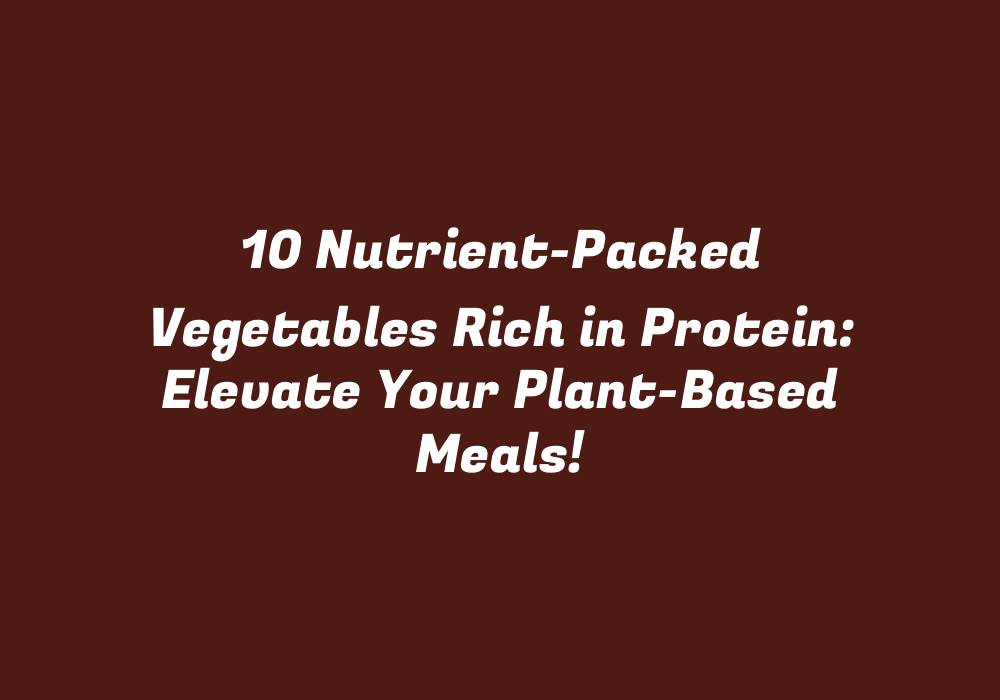Introduction: Exploring Vegetables as Protein Powerhouses for Plant-Based Diets
In recent years, there has been a growing interest in plant-based diets as more people become aware of their numerous benefits to both health and the environment. However, one common misconception about vegetarianism is that it lacks sufficient sources of protein. But what if we told you that various vegetables can provide all the nutrients your body needs for growth, maintenance, and repair? Here’s a guide to 10 nutrient-packed vegetables rich in protein that are perfect additions to elevate your plant-based meals.
1. Spinach – The Lean Green Machine
Spinach is a popular leafy green vegetable known for its impressive nutritional profile, including a good amount of protein. It boasts a high content of iron and vitamins A and C, making it an excellent addition to any meal. Plus, with its mild taste, spinach blends seamlessly into various dishes such as smoothies, pasta, or stir-fries.
2. Broccoli – A Nutritional Powerhouse
Packed with vitamins K, C, and B6, along with manganese and potassium, broccoli is an excellent choice for vegan protein sources. It’s also low in calories and high in fiber, making it a great side dish or base for your plant-based meals. Whether you cook it in various ways – steamed, roasted, or as part of a stir-fry – broccoli offers a satisfying crunchy texture that complements any meal.
3. Kale – A Superfood with Protein Prowess
Known for its impressive nutritional value and vitamin C content, kale is an ideal vegan protein source. This leafy green provides various essential minerals such as calcium, potassium, and iron, while also boasting a good amount of dietary fiber and omega-3 fatty acids. It can be easily incorporated into any dish – from salads to smoothies or soups – adding not only protein but a plethora of health benefits too.
4. Lentils – The Ultimate Plant-Based Protein Booster
While they might not be a traditional vegetable, lentils deserve a spot on this list for their unparalleled nutritional value and ability to provide an excellent source of protein. High in fiber and low in calories, these tiny legumes are also packed with folate, iron, and B vitamins. With a range of flavors available – from red lentils to green and black varieties – they are versatile enough for use in both warm and cold dishes like soups, salads, or even burgers.
5. Chickpeas – A Tasty Protein Powerhouse
Another non-vegetable entry on this list is chickpeas (also known as garbanzo beans), a staple in Mediterranean and Indian cuisines. Rich in protein, fiber, and B vitamins, they are often used to make hummus or can be added to salads, pasta dishes, soups, or even transformed into veggie burgers. Chickpeas also offer an abundance of minerals, including iron, zinc, and magnesium, making them a perfect plant-based protein alternative.
6. Quinoa – A Protein-Packed Grain Alternative
Quinoa is one of the few grain-like seeds that are considered complete proteins, offering all nine essential amino acids our bodies need for growth and repair. It’s also high in fiber, magnesium, and iron, as well as various vitamins such as B2 and E. This versatile seed can be used to replace rice or pasta in a variety of dishes – from breakfast bowls to salads, stir-fries, or even main courses.
7. Sweet Potato – The Versatile Protein Booster
Sweet potatoes are an excellent source of complex carbohydrates, offering a steady stream of energy throughout the day while also providing essential vitamins like A and C. Additionally, they’re packed with fiber and potassium and can be found in various varieties with slightly different nutritional profiles. Sweet potatoes can be baked, mashed, or roasted to create delicious side dishes, or incorporated into hearty vegan chili recipes for a satisfying meal.
8. Green Peas – A Surprisingly Nutrient-Rich Choice
Green peas are often overlooked as a mere garnish in many meals but offer an impressive array of nutrients including vitamins C, K, and B6, along with iron, folate, and potassium. They can be used to enhance the taste and nutrition content of various dishes – from salads to soups or pasta – making them a great addition to any plant-based meal.
9. Edamame – A Delicious Soybean Snack
Edamame, simply young soybeans still in their pods, is not only an excellent source of protein but also packed with essential vitamins and minerals. These include B vitamins, manganese, folate, and phytochemicals, which contribute to overall health and wellness. They can be steamed, boiled, or even added directly to stir-fries or salads for a protein boost.
10. Tempeh – A Protein-Rich Vegetarian Alternative
Tempeh is a fermented soybean product with a unique texture and nutritional profile. It’s rich in protein, fiber, and essential vitamins like B6 and K2. Additionally, tempeh contains all nine essential amino acids, making it a complete protein source for vegans and vegetarians. This versatile food can be used in various dishes – from burgers to pasta or even as a salad topper – ensuring that plant-based meals never lack the necessary protein needed for optimal health and satisfaction.
In conclusion, incorporating these 10 nutrient-packed vegetables into your diet not only ensures a healthy balance of nutrients but also helps break stereotypes about vegetarianism by proving that it’s possible to thrive on plant-based proteins alone. From leafy greens like spinach and broccoli to lentils and quinoa, these options are diverse enough to elevate any plant-based meal while satisfying your nutritional needs.
